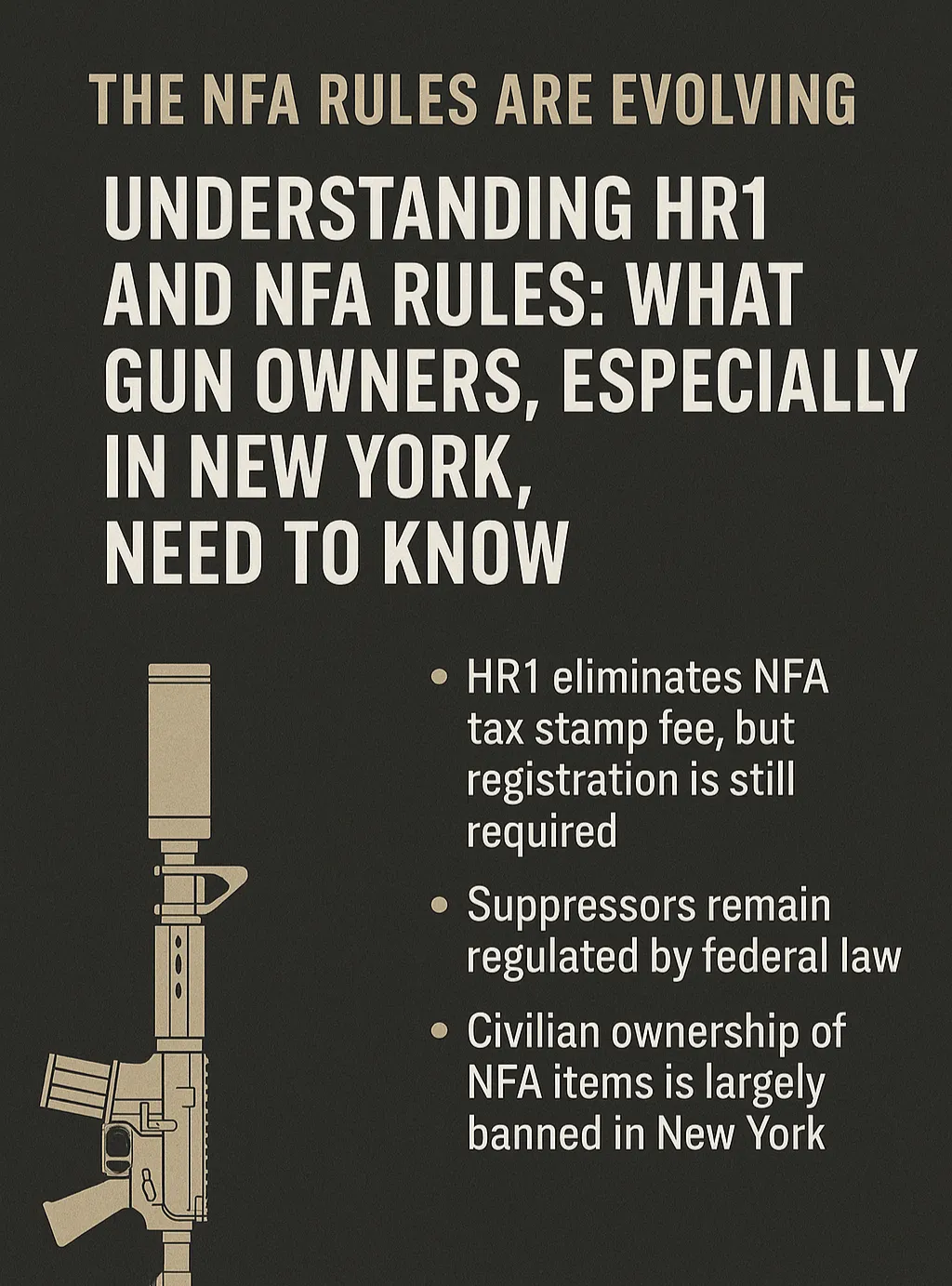
Intermediate Handgun
Intermediate Handgun
Our handgun training course, led by a NRA-certified instructor, enhances firearm handling, accuracy, and speed. Through live-fire drills, we refine shooting mechanics, target acquisition, and performance under various conditions. This hands-on course builds confidence and proficiency, making it ideal for all skill levels—whether for qualifications, competitions, or recreational shooting.
Equipment Requirements:
If using a pistol: Bring two magazines.
If using a revolver: Bring a speedloader.
By the end, you’ll have the knowledge and experience to handle your firearm safely and effectively with greater control and precision.
Learn more about Our Classes

HR1 and the NFA: What Gun Owners Need to Know—Especially in New York
The NFA Rules Are Evolving: What HR1 Means for Gun Owners—Especially in New York
The passage of HR1, also known as the "Big Beautiful Bill," has sparked important conversations around gun ownership—particularly for those interested in items regulated under the National Firearms Act (NFA). One of the most talked-about changes: the elimination of the $200 tax stamp fee previously required to register certain firearms and accessories, such as suppressors and short-barreled rifles (SBRs).
While this removes a financial barrier, it does not remove the legal steps or responsibilities tied to these items at the federal or state level. In fact, New York State law remains one of the strictest in the country, and HR1 does not override those restrictions.
What Did HR1 Actually Change?
HR1 eliminated the $200 tax stamp fee required for the transfer and registration of NFA-regulated items. This includes:
Suppressors (silencers)
Short-barreled rifles (SBRs)
Short-barreled shotguns (SBSs)
Machine guns
Any Other Weapons (AOWs)
However, the overall process remains in place:
You must still complete ATF Form 4.
Background checks, fingerprinting, and federal registration are still required.
ATF approval is still mandatory before possession.
This change is scheduled to take effect in the first fiscal quarter of 2026. While it does ease cost, it doesn’t simplify the process or change state restrictions.
Quick Refresher: What Are NFA Items?
NFA items are considered higher-risk and subject to special regulation under federal law. These include:
Suppressors
SBRs and SBSs
Machine guns
AOWs (such as disguised firearms or uniquely configured weapons)
Ownership of any NFA item without following the legal process is a federal offense, regardless of the tax fee's removal.
Importantly, the final version of HR1 did not remove suppressors from the legal definition of a "firearm" under federal law. This means suppressors still require Form 4 registration, even though there’s no longer a fee.
Suppressors Are Still Regulated
Suppressors are subject to both the National Firearms Act and the Gun Control Act of 1934. Even with HR1:
Suppressors require federal registration
Must be transferred through a licensed Class 3 dealer
Must go through the Form 4 process and ATF approval
Suppressor ownership is currently legal in 42 states, while 8 states, including New York, either heavily regulate or outright prohibit them.
New York Residents: What You Need to Know
HR1 made national news, but New York law has not changed. The state still enforces strict prohibitions on most NFA items.
Are Suppressors Legal in New York?
No. Suppressors are illegal for civilian ownership in New York.
Under New York Penal Law § 265, suppressors are classified as prohibited weapons—alongside machine guns and short-barreled rifles. This means:
Possession
Transfer
Sale
Importation or transport
...of suppressors is banned, regardless of your federal status. Even with an approved ATF Form 4, state law overrides federal allowances. Violating this law can result in felony charges.
Why Are Suppressors Banned in New York?
New York’s ban stems from long-standing gun control policies and misconceptions, such as:
Fear that suppressors facilitate crime
Classification of suppressors as "inherently dangerous"
Lack of recognition for their use in hearing protection, recreation, or hunting
While suppressors are seen as safety tools in most of the country, New York law treats them as contraband.
Are There Any Legal Pathways to Own NFA Items in New York?
Yes—but only under narrow, regulated circumstances:
Law Enforcement: Agencies and officers may use NFA items when approved for duty-related roles.
Licensed Dealers (FFLs): FFL holders with the proper Special Occupational Tax (SOT) designation may possess NFA items for demonstration, transport, or transfer—not for personal use.
Museums and Collectors: Certain Curio & Relic (C&R) machine guns, registered before 1986, may be possessed by federally licensed collectors or institutions under strict criteria.
For most civilians, legal ownership of NFA items is not possible within New York’s current laws.
If you're a New York resident:
Educate yourself on both state and federal laws
Don’t assume federal approval means state legality
Consult a firearms attorney if you're exploring any exceptions or professional licenses
Why This Matters
HR1 is a notable change for gun owners in states that permit NFA items, reducing cost but not regulation. For states like New York, it’s a reminder that state laws take priority when it comes to what you can legally own.
Whether you're a firearms enthusiast or just trying to stay compliant:
Stay current on evolving laws
Know the differences between federal policy and state restrictions
Always seek legal guidance before acquiring or transferring regulated firearms
Final Thoughts
HR1 eliminates a long-standing financial hurdle, but does not eliminate the legal complexity of owning NFA items. For residents of most states, this could signal a more accessible future. For New Yorkers, the path remains highly restricted.
Stay informed, stay compliant, and if you're unsure—consult a professional.
Helpful Resources:
© 2025 Zack’s Sports Inc. – All rights reserved